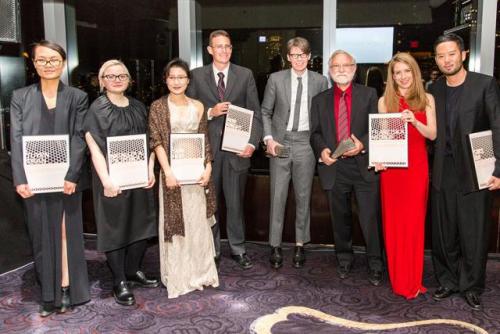
CSE faculty-affiliate Rob Knight is a newcomer to UC San Diego, but now he is also being honored as a (relative) newcomer to the United States. The Vilcek Foundation has named Knight the winner of a Creative Promise Prize in Biomedical Science for his "groundbreaking research on microbial communities and the development of computational tools that honed the analysis of microbial data." The Vilcek Foundation honors and supports foreign-born scientists and artists who have made outstanding contributions to society in the United States. Rob Knight was born in New Zealand, where he earned his bachelor's degree from the University of Otago in 1996, before going on to do his Ph.D. at Princeton University. While at the University of Colorado, Knight also became a Howard Hughes Medical Institute Early Career Scientist (2009-2014).
 In addition to his affiliation with the CSE department at UC San Diego, Knight (pictured center left with fellow recipients of Vilcek Prizes) is also a professor of pediatrics in the School of Medicine. His computational and experimental approaches have led to rapid and cost-effective microbial DNA sequencing methods and data analysis platforms that help to understand similarities among microbial communities based on their evolutionary relationships. Knight has used informatics to show how maps of distinct microbes thriving in different parts of the human body change over time, how human-associated microbes can influence metabolic health, and how microbes can be used as timekeepers to help establish the time of death in forensic examinations. Knight is also continuing his work in bioinformatics, after a decade of developing software to analyze the abundance of microbial data that is now becoming available to researchers. Knight's recent book, "Follow Your Gut," was published by TED Books in April 2015. Rob Knight was born in Dunedin, New Zealand. "New Zealanders tend to pride themselves on ingenuity and making do with whatever resources happen to be available," said Knight, but he is going beyond what's available to creating projects that encourage the public to contribute their individual microbiome data for future research and the greater good. He has set out to catalog the diverse kinds of microbes found in ecosystems across the globe in an ambitious, collaborative effort called the Earth Microbiome Project, but Knight is also a co-founder of the American Gut Project. For the latter project, anyone in the U.S. can contribute $99 and a personal sample to have their gut microbiome analyzed (and contributed to the growing store of data available to researchers).
In addition to his affiliation with the CSE department at UC San Diego, Knight (pictured center left with fellow recipients of Vilcek Prizes) is also a professor of pediatrics in the School of Medicine. His computational and experimental approaches have led to rapid and cost-effective microbial DNA sequencing methods and data analysis platforms that help to understand similarities among microbial communities based on their evolutionary relationships. Knight has used informatics to show how maps of distinct microbes thriving in different parts of the human body change over time, how human-associated microbes can influence metabolic health, and how microbes can be used as timekeepers to help establish the time of death in forensic examinations. Knight is also continuing his work in bioinformatics, after a decade of developing software to analyze the abundance of microbial data that is now becoming available to researchers. Knight's recent book, "Follow Your Gut," was published by TED Books in April 2015. Rob Knight was born in Dunedin, New Zealand. "New Zealanders tend to pride themselves on ingenuity and making do with whatever resources happen to be available," said Knight, but he is going beyond what's available to creating projects that encourage the public to contribute their individual microbiome data for future research and the greater good. He has set out to catalog the diverse kinds of microbes found in ecosystems across the globe in an ambitious, collaborative effort called the Earth Microbiome Project, but Knight is also a co-founder of the American Gut Project. For the latter project, anyone in the U.S. can contribute $99 and a personal sample to have their gut microbiome analyzed (and contributed to the growing store of data available to researchers).

